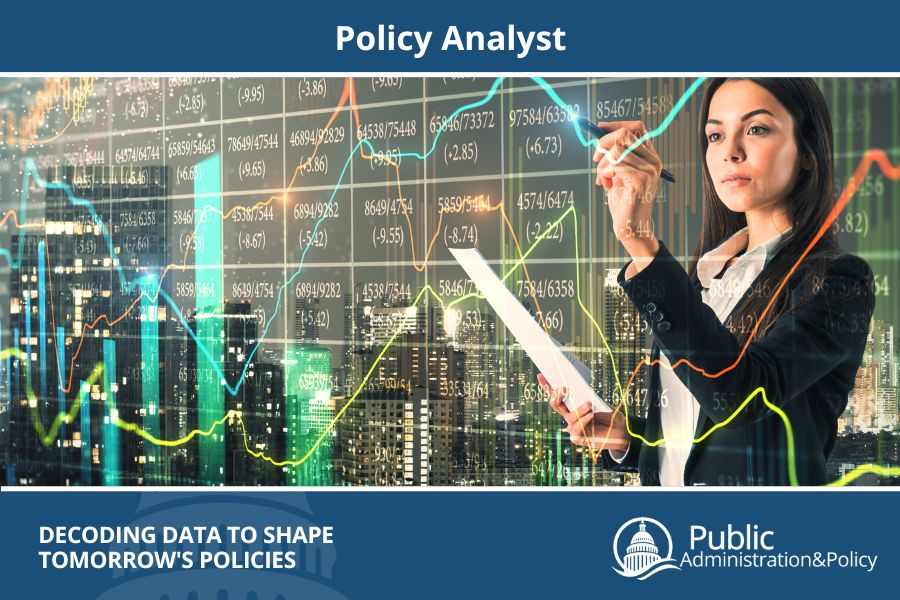How to Become a Policy Analyst
Translate Complex Data Into Policies That Shape Society and Make an Impact
Policy Analysts are essential contributors to developing public policies that address critical societal challenges and improve community well-being. These professionals work behind the scenes to gather and interpret complex data, evaluate the effectiveness of existing programs, and craft evidence-based recommendations that guide decision-makers. Their work directly influences local, state, and national policies, shaping initiatives in areas such as healthcare, education, housing, and environmental sustainability.
In addition to analyzing data, Policy Analysts assess proposed policies’ social, economic, and political implications. They collaborate with stakeholders, prepare reports, and present findings clearly and compellingly to inform policymakers and the public. Their unique ability to translate technical information into actionable insights makes them invaluable in creating effective and equitable solutions.

Table of Contents
What Is a Policy Analyst?
A Policy Analyst researches and evaluates public policies to determine their effectiveness and impact. They work across public and private organizations to ensure that government initiatives and corporate programs are designed and implemented effectively.
Key Job Duties
- Policy Research: Conduct in-depth research to analyze issues and propose solutions.
- Data Analysis: Use statistics and other tools to assess program outcomes.
- Report Writing: Produce high-quality reports and policy briefs for decision-makers.
- Stakeholder Engagement: Collaborate with elected officials, civil servants, and community leaders.
- Advocacy: Present findings and recommendations to influence policy development.
Policy Analysts work in government agencies, think tanks, nonprofit organizations, and private-sector consulting firms. They focus on healthcare, education, environmental policy, and economic development. Think tank research jobs, in particular, are popular career paths for those passionate about influencing policy decisions through rigorous analysis.
“The right balance between equity and efficiency is crucial for effective public policy.”
— Joseph Stiglitz, Economics of the Public Sector
A strong educational foundation is essential for aspiring Policy Analysts. Public policy, political science, or economics degrees provide the skills needed to excel in this role.
Best Degrees for Policy Analysts
- Bachelor of Public Policy: Covers governance, policy analysis, and public affairs.
- Bachelor of Political Science: Provides a foundation in government processes and political theory.
- Master of Public Policy (MPP) Offers advanced program evaluation and policy development training.
- Ph.D. in Public Policy: Prepares professionals for research and high-level advisory roles.
Why Online Programs Are Beneficial
Online degree programs offer flexibility for working professionals and those who balance personal commitments. Many universities in the United States offer online MPP programs tailored for students pursuing a career in public policy.
Explore Degree Options:
Step 2: Learn About Policy Analyst Salaries
Policy Analysts’ salaries vary based on education, experience, and employer type. These roles often offer competitive pay, particularly in federal government positions, large consulting firms, and think tank research jobs.
Salary Range by Experience
- Entry-Level Analysts: $50,000–$65,000 annually.
- Mid-Career Analysts: $70,000–$90,000 annually.
- Senior Analysts or Directors: $100,000+ annually.
Factors Influencing Salary
- Education Level: Advanced degrees, such as an MPP or Ph.D., often lead to higher salaries.
- Specialization: Areas like healthcare policy and economic development are in high demand.
- Employer Type: Federal government and large consulting firms typically pay more than nonprofit organizations.
Visit the Bureau of Labor Statistics (BLS) for detailed salary insights for related roles.
Step 3: Build Analytical and Communication Skills
To excel as a Policy Analyst, strong analytical and communication skills are essential. Attention to detail and the ability to synthesize complex information are key to success in this role.
Key Skills for Policy Analysts
- Quantitative Analysis: Proficiency in tools like Excel, SPSS, or R for data analysis.
- Writing and Editing: Crafting clear and concise policy briefs and reports.
- Stakeholder Communication: Engaging with diverse audiences, including legislators and community members.
- Problem-Solving: Developing innovative solutions to address public issues.
- Time Management: Managing multiple projects and deadlines effectively.
Certifications to Enhance Your Career
- Certified Public Policy Professional (CPPP): Demonstrates policy analysis and development expertise.
- Data Analysis Certification: Offered by platforms like Coursera or edX, focusing on tools like Tableau and Python.
Step 4: Find a Policy Analyst Job
Policy Analyst jobs are available across various sectors, providing opportunities to influence public policies and private sector strategies.
Industries That Hire Policy Analysts
- Government Agencies: Analyze and recommend local, state, and federal policies.
- Think Tanks: Conduct research and develop policy recommendations on societal issues. Think tank research jobs are ideal for individuals interested in in-depth analysis and thought leadership.
- Nonprofit Organizations: Advocate for policy changes and evaluate program effectiveness.
- Private Sector: Advise corporations on regulatory compliance and strategic planning.
Notable Employers
Search for policy research jobs on platforms like Idealist and LinkedIn.
Career Opportunities in Policy Analysis
A career as a Policy Analyst offers numerous opportunities for growth and specialization. Popular career paths include:
- Program Evaluator: Assess the effectiveness of public and private programs.
- Policy Advisor: Provide strategic guidance to policymakers and stakeholders.
- Budget Analyst: Monitor spending and develop financial plans for government agencies.
- Research Fellow: Conduct in-depth studies on public policies and publish findings.
Organizations like the American Society for Public Administration (ASPA) offer networking and professional development resources to advance your career.
Sources
- Bureau of Labor Statistics (BLS). “Political Scientists.” https://www.bls.gov
- Brookings Institution. “Careers in Public Policy.” https://www.brookings.edu
- Payscale. “Policy Analyst Salary Overview.” https://www.payscale.com
- Urban Institute. “Research and Policy Analysis Resources.” https://www.urban.org
Acknowledgments
This content draws from insights provided by think tanks, government agencies, and academic institutions—special thanks to Joseph Stiglitz for his contributions to understanding equity and efficiency in public policy.
